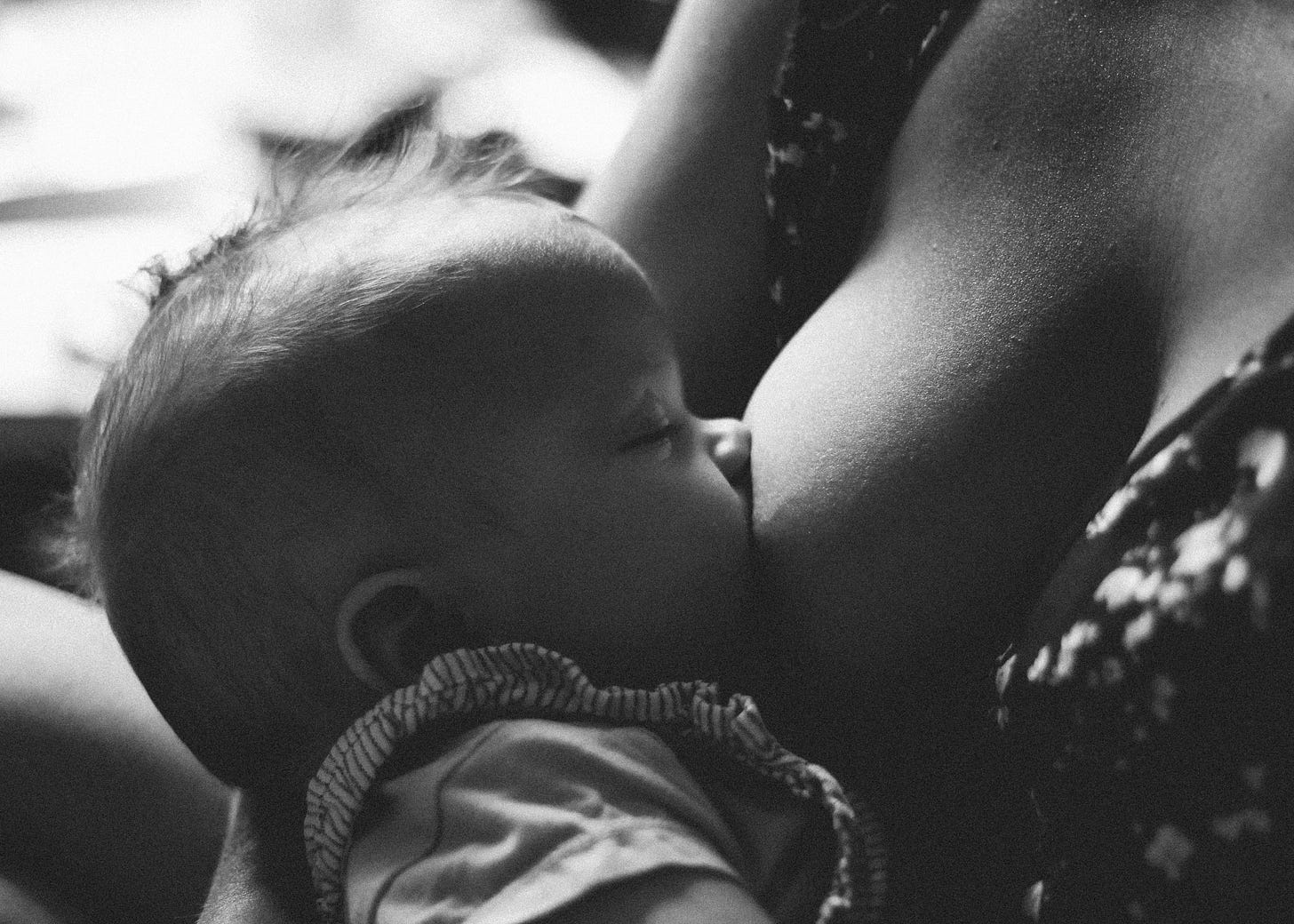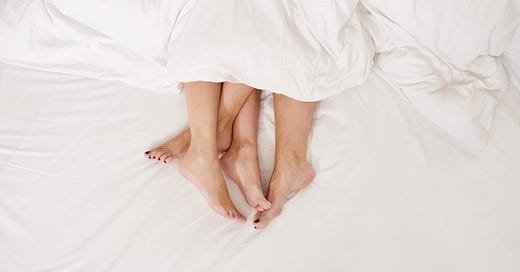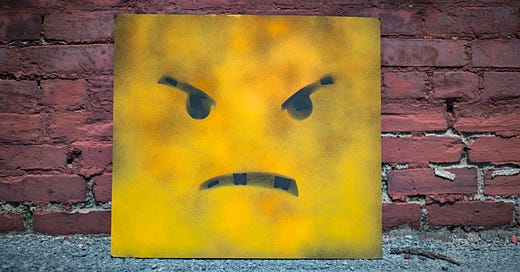
Discover more from Liberating Motherhood
Men, not hormones, are the leading cause of postpartum depression
Why your postpartum depression is probably the joint fault of society and your partner.
This is an edited and updated version of an older piece.
A few years ago, I stumbled across a blog giving men advice on having sex with their partners after pregnancy. Written by a self-described feminist man, the now-deleted post argued that it’s normal for men to call their partners names and scream at them after giving birth because, of course, childbirth is stressful (for dads, apparently). So men must work to get their abused and struggling partners in the mood.
This centering of men, this letting men off the hook, has become a cornerstone of postpartum discourse.
We tell women to be patient with their husbands, because the poor dears may not be able to immediately step up. Women, of course, must always be baptized by fire, with no option to not set up.
We suggest that a man’s abusive behavior might be because of “male postpartum depression.”
We talk about how new parenthood is stressful for “both parents.” Pretending that the burdens of parenthood are equal in a patriarchal society does not make it true, but it sure does obscure the burden women face.
We expect that women will continue to do just about everything—whether they’re bleeding, hemorrhaging, recovering from major surgery, fighting an infection, or doing all of the above—immediately after giving birth. We insist that they thank men for simple 10-minute tasks. But if a woman wants gratitude, to be honored for her ability to bring life into the world, or God forbid a push present, she’s an entitled monster who deserves to suffer.
No wonder postpartum depression rates are so high.
Official statistics suggest that 1 in 8 women have postpartum mental health issues. But almost every mother I talk to says she struggled for months, and sometimes even years, after giving birth.
Could it be that postpartum depression is the normal state in a sexist society?
Maybe if we looked at the objectively terrible conditions in which we expect women to mother, instead of blaming everything on their woman hormones, we could finally solve this problem. That, though, would require that we demand things of men—like an equitable division of household labor, for example, or not being whiny crybabies as their partners push out children. And in a patriarchal society, we’re perfectly fine with sacrificing women on the pyre if doing so helps men escape accountability.
Why Unkind Men, Not Hormones, Are the Leading Cause of Postpartum Depression
A few days ago, I was reading an online mom forum. A woman shared her experience so far: her husband refused to “babysit” the baby. The one time she left him with the baby so she could go to the grocery store, the baby rolled off of the couch where he had so recklessly left her. She was waking multiple times a night. He refused to get up, in spite of being on paternity leave. She was recovering from major surgery, but was still cooking and cleaning for him. And she wanted to know if she was being “dramatic” and “unreasonable” by asking her husband to take her older child for a few hours once a week.
The most popular response on the forum:
“Have you been screened for postpartum depression?”
This poster’s problem was clearly that she didn’t have enough time and sleep—and that her partner, who was able to step up and provide her with more of both by being less of a lazy, worthless piece of shit—had elected instead to relax and occasionally endanger her baby’s life.
Blaming it all on postpartum depression serves three purposes: It gaslights the woman into believing her requests for decency are unreasonable, blames her for her own suffering, and helps her partner escape accountability.
I have a dear friend whose husband repeatedly commented on the grossness of her body and of birth as she brought his child into the world. She doesn’t dare blame her eating disorder on him, even though the connection seems obvious to me.
Over the years, I’ve counseled hundreds of women who tell me that their partners made them feel bad, ashamed, or alone during and after birth. Their most common question isn’t about how he can make amends. It’s whether they’re spoiled princesses for wanting basic human decency.
As my friend Kathzilla likes to say (btw go check out her amazing art): Society is oppressing us into postpartum depression. Too often we diagnose postpartum depression when what we really mean is postpartum oppression.
I don’t know a single woman with postpartum depression whose partner shoulders a fair share of the load, or who truly cared for them in the postpartum period. Do you?
So why is it that we will blame anyone and anything other than the lazy man sleeping in bed next to the exhausted, sobbing woman?
The Myth of Women and Their Crazy Hormones
Navigate to any website about postpartum depression and you’ll promptly be informed that hormones cause it. The scientific research does not in any way support this claim.
In the first two weeks after birth, hormones are shifting wildly, and this is associated with a risk of mood swings. That’s why most people report some form of baby blues after birth. But the hormonal swings of the postpartum period only last 6 to 8 weeks. Thereafter, if a mother is breastfeeding, her estrogen levels remain low. And otherwise, they return to normal. Neither can explain postpartum depression. Here’s why:
Women spend their entire lives hearing that their estrogen makes them crazy and unstable. Virtually every consumer health site claims that estrogen is the reason women have higher rates of depression (never mind the fact that research on the subject suggests that men are just less likely to report depression). Yet estrogen levels drop in the postpartum period. And research on post-menopausal women suggests that they have lower rates of depression and improved well-being.
Either estrogen is making things worse, in which case it’s not causing postpartum depression. Or it’s not, in which case hormones aren’t to blame for depression. We can’t have it both ways.
This is classic gaslighting. The message to women is that we are fundamentally unstable, driven by hormones we don’t understand and can’t control (as if men don’t have hormones, or hormonal swings).
Moreover, people with postpartum depression almost never get their hormone levels checked. And studies on postpartum depression tend not to check hormone levels either. So there’s zero compelling evidence that any specific hormonal swing causes postpartum depression. There’s overwhelming evidence, though, that sleep deprivation, unkind treatment, malnourishment, exhausting work, lack of social support, and the other experiences that are par for the postpartum course do cause postpartum depression.
It’s time we stop gesturing broadly at women, muttering, “hormones,” and using that to explain away the terrible way we treat them. Especially when there’s ample evidence that women face massive stress, abuse, and trauma after giving birth.
We also know now that the evidence supporting antidepressants as compared to a placebo is weak. So we’re not even managing to medicate away a social problem; we’re giving medication that doesn’t work, instead of demanding the social change that might actually help.
Men: The Real Cause of Most Postpartum Depression
The typical postpartum experience begins with a difficult birth, inadequate support for recovery, and endless demands from family members. When men have medical issues, their partners care for them. When women do, their partners are angry at them for not continuing to do everything. So the typical postpartum woman goes home to a house she’s still expected to clean, to meals she’s still expected to make. To sleeplessness. To a partner who doesn’t care about her emotions or well-being. To kids who need her. And she just can’t do it all.
In a 2020 study, the strongest predictor of postpartum depression (other than prenatal depression) was abuse. And who is abusing women in the postpartum periods? Their partners. Another found that general social support, and social support specifically from the baby’s father, were important protective factors, and their absence a key postpartum depression risk factor.
A 2015 study found that sleep deprivation predicted postpartum depression. Male partners lose an average of just 13 minutes of sleep in the postpartum period. Your shitbag husband is buying his sleep with your mental health. He’d rather risk your suicide than get up with the baby he helped to make.
Other research echoes these conclusions, finding that any form of abuse, not just physical abuse, can cause postpartum depression.
My own research paints a horrifying portrait of postpartum life, showing that abuse is not just common, but typical.
No wonder so many of us end up depressed. And the research proves that men are the main culprit. We’ve taught women that their time doesn’t matter. We’ve told them that they can’t expect help from their partners. We’ve turned male laziness into a joke. And then, when women can’t do it all on their own, we use mom-guilt to make them feel inadequate, and to convince them to keep trying in the futile effort to live up to society’s vision of motherhood.
The men who live and father children with women who develop postpartum depression are the best equipped to support women—and they’re failing miserably. They are the primary reason women are overworked, exhausted, unsupported, and feel alone.
Why Don’t We Call Postpartum Depression What it is?
So if the evidence is so clear that men play a central role in postpartum depression, why don’t we tell people that?
Why don’t doctors write prescriptions for more sleep? Why don’t midwives tell husbands to get off of their lazy asses?
For the same reason we think men shouldn’t know that children need food, or that their partners have feelings.
Patriarchy teaches us that women just matter less. It’s completely reasonable for a man to buy his free time and sleep with his partner’s exhaustion, no matter the cost to her or her children. In a patriarchal society, asking men to give something up is unthinkable.
But until we do, suicide will continue to be a leading cause of postpartum death.
And women will continue to believe that their depression is their fault.
Stop gaslighting women about postpartum depression. Depression is the natural, logical reaction to the circumstances in which we expect women to mother.
An Alternative Postpartum Depression Checklist
Postpartum depression checklists tend to focus on the individual, treating the depression as innate to them, rather than the context in which they are recovering from birth. I propose an alternative list of questions:
If you answer no to two or more of the following, your postpartum mental health issues are probably your partner’s fault:
Is your partner doing at least half of the housework while you recover from birth?
Is your partner doing at least half of the non-breastfeeding parenting while you recover from birth?
Is your partner either waking up with the baby, or doing other things to ensure you can sleep, such as letting you sleep in?
Has your partner shown you consistent care and compassion in the postpartum period?
Can you trust your partner to safely and competently care for your baby?
Was your partner supporting and loving during your birth?
Has your partner shown concern for your physical well-being as you recover from birth?
If you answer yes to any of the following, your postpartum mental health issues are probably your partner’s fault:
Has your partner pressured you to have sex, especially before the 6 week mark?
Has your partner forced you to have sex?
Has your partner yelled at you or called you names?
Has your partner called you dramatic or hysterical?
Has your partner ignored you when you cried or asked for emotional support?
Has your partner hit you?
Has your partner broken or thrown objects?
Has your partner pressured you to lose weight, or insulted your postpartum body?
Has your partner enlisted other people to insult you, or failed to protect you from his family?
Do you feel afraid of your partner?
Has your partner mocked your emotions?
Do you feel called out or angry about this post? Are you contemplating reminding me that it’s not all men? Pause. Of course it’s not all men. Many men are loving and supportive partners during the postpartum period. But if this post makes you feel defensive, you’re not one of them.
What if you’re a woman who feels defensive about this post, who wants to tell me that your man did everything for you and you still became depressed? Depression is real; my argument is that our society is failing depressed women, and that the first line of defense against depression—men—is doing almost nothing.
Maybe your husband really did step up. You still gave birth in a toxic culture that abuses mothers. But sometimes women feel the need to defend their husbands as a way to justify things to themselves, as a way to pretend things are ok. So consider that things might be as rosy as you hope.
Mental illness is real. And sometimes women get depressed after giving birth for no apparent reason. No matter the cause, a woman deserves treatment. But to treat depression, we have to understand where it’s coming from.
Until we stop treating women’s time and lives as expendable, exploitative partnerships will be the norm—and so too will postpartum suffering.
Disclaimer: This is not an anti-medicine or anti-psychiatry post. If medication works for you, you should use it. Please exhaust all treatment options, including demanding better of your partner.
Subscribe to Liberating Motherhood
For mothers who are pissed off about sexism, household chore inequality, and endless misogynistic bullshit, and for the allies who want a better world for all of us.

















Ding ding ding! I would shout this from the rooftops if I weren't in active litigation from my abusive partner.
I experienced postpartum psychosis after my firstborn. When I checked myself into the hospital after I couldn't sleep for days and was beginning to hallucinate, the psychiatrists consistently assured me that my thinking was actually much more logical and clear than I thought. One gently pulled me aside and said "have you ever considered you may be in an abusive relationship? Your responses line up more closely to those facing abuse vs. those with a mental health disorder."
Fast forward three years, I had another baby. My risk of PPP recurrence was over 50%. Somehow, I didn't experience so much as the baby blues. And this was caring for a busy toddler on top of a newborn. What had changed? I had separated from my abusive, alcoholic husband (who then filed for divorce, claiming he needed sole emergency custody... thankfully that was denied) and had the support of family, a night doula and postpartum mental health providers instead. A world of difference in my recovery and wellbeing... despite being in the middle of a stressful, expensive divorce.
Yes, in my case it was definitely the man!
This whole article makes me want to go back to my 30 year old self who had just given birth, and hug her for the next 20 years. I had pre-partum depression, and this shows me it was pre-partum oppression. And post-partum oppression. I hate this patriarchal society who told me that this oppression is what I wanted. I miss younger, healthier, never-suicidal Jodi, who had goals and dreams and wishes and thoughts and creativity. I need to go grieve now. [also; thank you, Zawn. 💙]